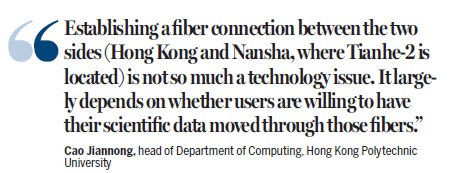Tying up with Tianhe -2
Updated: 2015-05-28 07:27
By Frannie Guan in Hong Kong(HK Edition)
|
|||||||||
Editor's note: In this pilot edition of our series on some of HK's brightest science and tech professionals collaborating with institutes and experts on the Chinese mainland, we bring you the story of a supercomputing machine in Guangzhou which has the potential to make research in HK much more easy and effective. .
Huang Xuhui, assistant professor at the Department of Chemistry, Hong Kong University of Science and Technology (HKUST), is confident he is closing in on a medical breakthrough. He is close to finding a way to inhibit the malfunctioning of certain protein molecules that contribute to a long list of illnesses including cancer, diabetes, respiratory illnesses, and Alzheimer's disease which is Huang's area of specialization.
Huang believes that whether the breakthrough comes sooner or later depends on regular access to the world's fastest supercomputer, Tianhe-2, across the border in Guangzhou.
Last year, Huang, in a collaborative effort with a team headed by Professor Nancy Ip, dean of the School of Science at HKUST, discovered a malfunction of the protein EphA4 that plays a part in the cognitive impairment associated with Alzheimer's disease.
Huang says the most effective way to prevent EphA4 from malfunctioning is to change its structure. That will require delicate computations, to determine the minimum amount of energy needed to break down the chemical bonds holding the molecule together, and to remove as little as a single electron, from the original molecule.
The possibilities are almost infinite. Evaluating each molecular compound, individually, through conventional computers would demand months, even to achieve rudimentary results.
Supercomputers, with tens of thousands of processors, perform mind-boggling numbers of calculations at lightning speed. If the calculations needed for Huang's research can be carried out "in parallel" through a supercomputer, it will save a great deal of time.
Hong Kong has no supercomputers. When it comes to access, many local researchers prefer to work from the supercomputer centers on the mainland. Huang prefers to use the Shenzhen center. It's the closest among the five supercomputing centers on the mainland where his students needn't travel far.
The current situation, however, creates major headaches for researchers in Hong Kong.
"The cable connection between Hong Kong and Shenzhen is slow, currently we can only get hundreds kilobytes per second," said Huang. "It would take days for us to transfer the massive data we produce."
Every time Huang needs to use the supercomputer for his research, he needs to pack up the data, hand it to his students, so they can carry it all the way to the Shenzhen supercomputing center. Then the data has to be copied and when the computations are finished, they have to be carried back to Hong Kong. During peak research season, a few trips every month would be necessary.
In December 2014, a solution was proposed to address the slow data transfer problem between Hong Kong and the mainland, when the supercomputer (Tianhe-2) center in Guangzhou signed an agreement to set up a sub-branch at Fok Ying Tung Research Institute of HKUST in Nansha district, Guangzhou.
Tianhe-2 has been operating for more than a year. It was built by the National University of Defense Technology and run by the Guangzhou government. The system is going through upgrading to double the calculating speed, currently at 33,860 trillion calculations per second. The upgrade is expected to be completed by the end of the year.
Yuan Xuefeng, director of the supercomputing center in Guangzhou, notes that research into pharmaceutical products is only one promising field in which supercomputers could assist Hong Kong. He sees a broader vision in innovational development, such as improving technology for making 3D movies. Supercomputer systems can better create 3D scenes by altering the colors of objects. He mentions improved automobile design as another strong possibility.
Data security
Lionel Ni, dean of HKUST Fok Ying Tung Graduate School, predicted that the problem for Hong Kong users can best be solved by installing special high-speed fibers for transmission of data from Hong Kong to Nansha in Guangzhou, where the supercomputer Tianhe-2 is located. That, says Ni, would give access to Hong Kong researchers requiring high-speed data processing.

Yuan said that the current slow speed of data transfer to the center is caused by the Internet firewall on the mainland. He pointed out that 80 percent of users who access the supercomputer from points on the mainland have no difficulty with data transfer.
Data security remains a major concern for some Hong Kong scientists carrying out sensitive research. "Establishing a fiber connection between the two sides is not so much a technology issue. It largely depends on whether users are willing to have their scientific data moved through those fibers," said Cao Jiannong, head of the Department of Computing at the Hong Kong Polytechnic University.
"Most companies would establish their own, more secured cloud to store their data in preference to using private services," said Cao. But even private data centers can be broken into by hackers.
The IT world was shocked over the data breaches of 2014, especially the devastating hack of Sony Pictures in December. The hackers went on to post unreleased Sony films on the Internet and made them available for downloading. Sensitive e-mails involving personalities and contract details were made public. Sony Pictures Entertainment co-chairman, Amy Pascal, was forced to step down.
There are other concerns from the mainland that computing resources could be misused for research in violation of mainland laws. Yuen said mutual trust is required between the two sides with detailed rules being set.
Cao describes supercomputing as a need-driven industry, whose success was largely dependent on how many will apply to use it and how many can actually use it. He notes that finance and property remain the backbone of Hong Kong's economy and he doubts supercomputers have much application for those fields.
Chief Executive Leung Chun-ying, during this year's Policy Address, announced that HK$5 billion will be distributed among several funds, to assist Hong Hong's innovation and technology development.
Though the government has not released detailed plans on how the money will be used, supercomputer users like Huang hope some of the funding will be used to facilitate greater access to supercomputers to assist in their research.
frannie@chinadailyhk.com


(HK Edition 05/28/2015 page7)